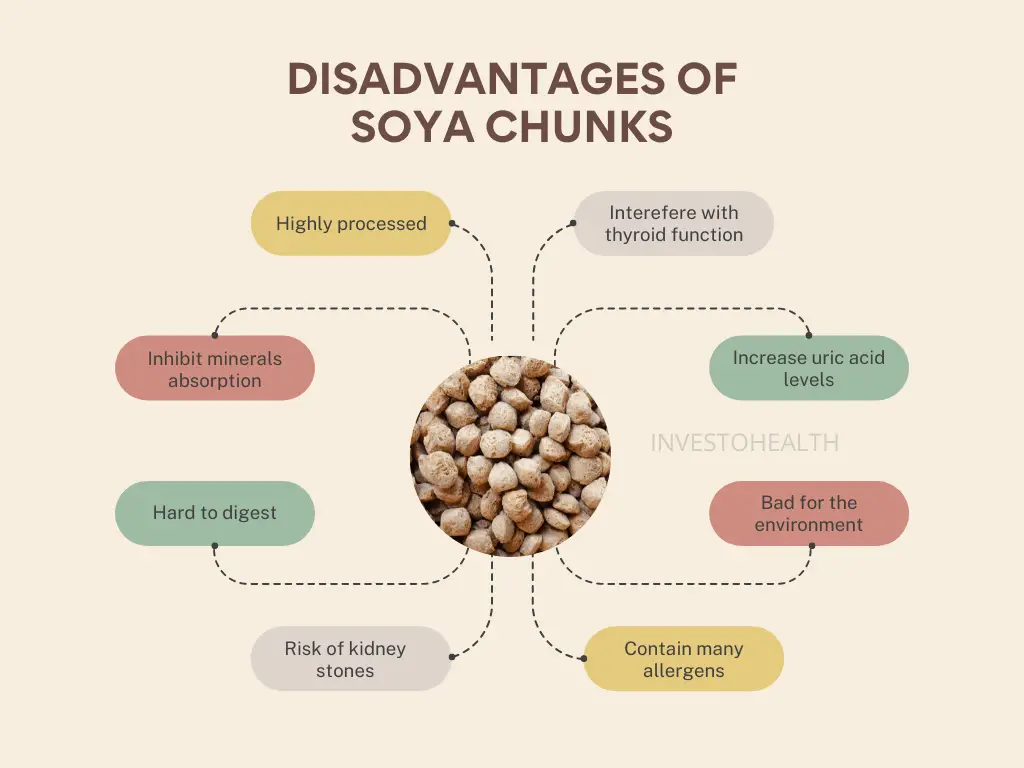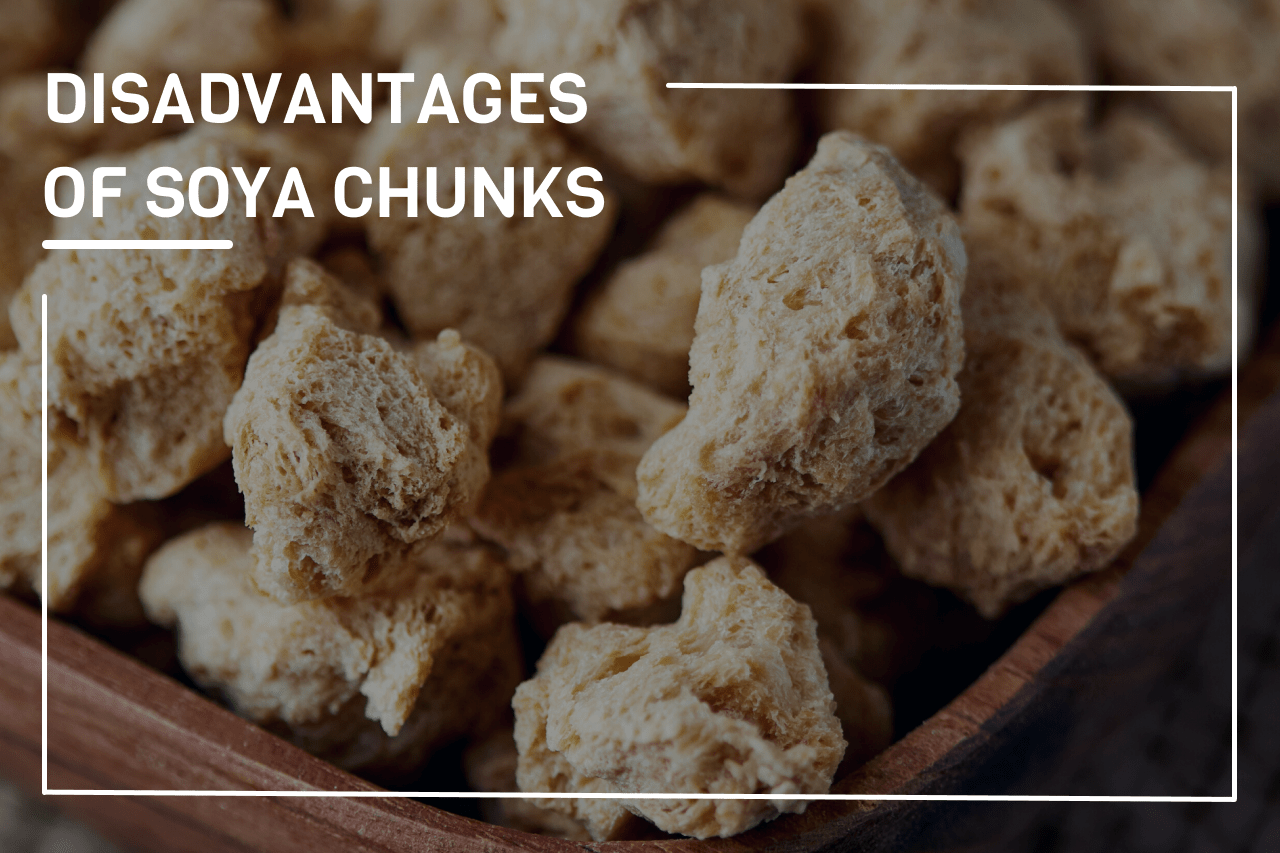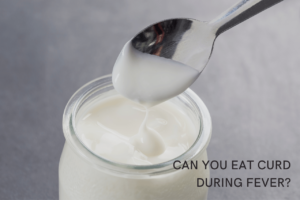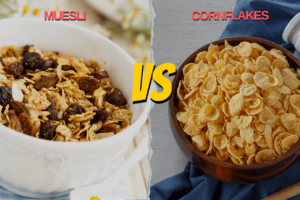Everyone seems to be talking about soya chunks lately. They are being touted as a healthy and affordable alternative to meat, and as a result, more and more people are incorporating them into their diets.
Although soya chunks have many benefits, there are also some major disadvantages that no one is talking about.
Therefore, In this post, I have shared a list of 8 of the major disadvantages of soya chunks that everyone should know. From their environmental impact to health risks, read on to learn everything about the potential downside of this popular meat alternative.
Also read: Soya Chunks vs Chicken: Which Is Better For Your Health?
8 Disadvantages of soya chunks

1. Soya chunks are highly processed food
Soya chunks are a defatted soybean meal made from soybean flakes that have been compressed and extruded into bite-sized pieces. Although soya chunks are a high-protein food, they are also highly processed and can contain unhealthy additives.
They undergo several manufacturing steps before they are ready to be consumed. This includes soybean meal processing, extrusion, and drying. As a result, soya chunks have a very different nutritional profile than whole soybeans.
Additionally, years of research have shown that heavily processed food often includes high calories, sodium and added sugar which is not good for your health.
2. Soya chunks can block certain mineral absorption
There is growing evidence that soybeans and soy-based products can interfere with the absorption of minerals in the body.
This is because they contain phytate or phytic acid, an inhibitor of the body’s minerals such as iron, calcium, magnesium and zinc.
This is a major concern for people who consume soya chunks as a source of protein, as it means that they may not be getting all the nutrients they need, leading to certain mineral deficiencies in the long run.
3. Soya chunks can be hard to digest
One of the major disadvantages of soya chunks is that if eaten in excess, they can be hard to digest. This is because they are high in an insoluble fiber called lignin.
Lignin is a complex molecule that is difficult to digest. This is because lignin is indigestible by enzymes in the stomach and intestines.
For people with a weak digestive system, this can lead to discomfort like bloating, gas, constipation and even diarrhea.
In fact, this is one of the reasons soy and soy-based products are generally avoided in Ayurveda.
4. Soya chunks Increase the risk of kidney failure
While eating soya chunks may help you develop muscles, eating an excess of it increases the risk of kidney failure as it contains oxalate.
Oxalate is a compound found in various plants, including soya. When ingested in large quantities, it can crystallize in the kidney, leading to kidney stones and eventually kidney failure.
Additionally, oxalates also bind to calcium and other minerals in the small intestine, reducing absorption and potentially leading to deficiencies.
5. Soya chunks can interfere with thyroid function
Soya chunks are the number one popular meat substitute, but many people don’t know that they can interfere with thyroid function.
They contain goitrogens, substances that can block the uptake of iodine by the thyroid gland. This can lead to a condition called hypothyroidism, which can cause a host of symptoms like fatigue, weight gain, and depression.
While goitrogens are harmless in small amounts, they can cause problems if you consume too much or already have thyroid problems.
6. Soya chunks increase uric acid levels
The overconsumption of soya-based products can elevate uric acid levels in your body. As per studies, soy products contain a moderate amount of purine and may predispose to raised serum uric acid (UA).
The increased uric acid levels can damage your kidneys and lead to the deposition of uric acid crystals around your joints, causing immense pain.
Avoid eating soya chunks if you have joint problems like gout or are at risk for gout.
7. Soya chunks have a negative environmental impact
Not only the excess consumption of soya chunks but also the high production of soy is linked to many disadvantages.
Soy is a versatile and affordable crop used in various foods, but its production can have negative environmental impacts. It is a major source of deforestation in many regions of the world, including the Amazon rainforest.
Large tracts of forest are cleared to make way for soybean farms, which destroys the habitat of many animals. Also, soy production generates greenhouse gases that contribute to climate change.
Despite these environmental concerns, soy is still a major part of the global food system due to its many use and low cost.
8. Soya chunks are loaded with many allergens
Besides phytic acid, soya chunks are loaded with many more allergens such as lectins, protease, oxalates and saponins. In fact, soy is one of the big eight allergens, along with other foods like cow’s milk, peanuts, wheat etc.
These allergens in soy are not only hard to digest, but they also inhibit the absorption of minerals in your body.
Additionally, unlike most beans, these allergens don’t wash or cook off, resulting in significant health risks.
Do soya chunks affect testosterone levels in males?
This is one of the most common questions asked by every man who consumes soy or soy-related products.
There is no definitive answer to this question as of yet. While some studies suggest that dietary soy may decrease testosterone levels in males, other clinical studies deny it.
If you are concerned about your testosterone levels, it may be worth avoiding soy or soy-based products or at least consuming them in a limited amount.
How much soya chunks should you consume?
Soya chunks are a cheap and versatile food that you should include in your diet. But how much soya chunks should you eat?
As per research, Eating 25 to 30 grams of soya chunks a day is good and will not increase the estrogen levels in the body. Neither will it increase the uric acid levels in the body.
However, it’s best not to consume soya chunks or any other soy-related products on a daily basis. A couple of servings a week is pretty enough.
Final words
Despite having many disadvantages, soya chunks are a widely consumed food product. That’s because they are cheap and readily available. Plus, they are a great alternative to high-protein foods that vegans or vegetarians can’t eat.
If you are looking to add soya chunks to your diet, moderation is the key.
Found this information helpful? Don’t forget to share it with other people.
Meanwhile, here are a few other posts that might be helpful for you:






